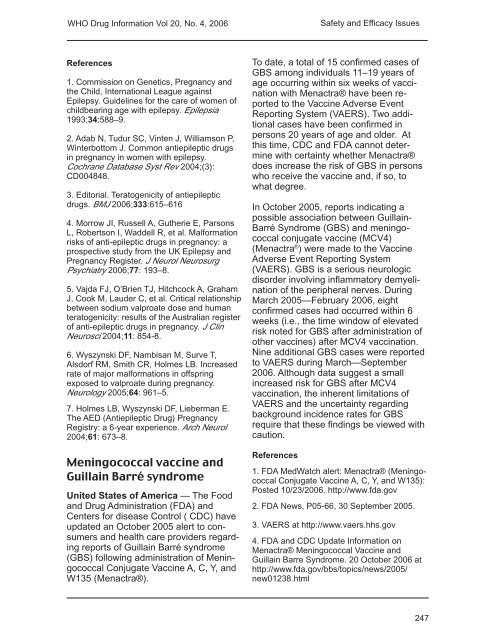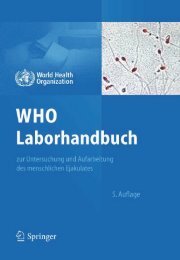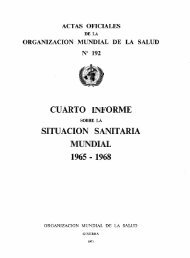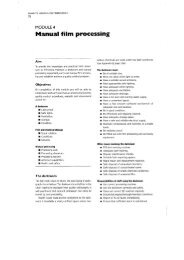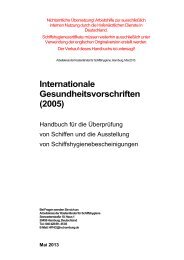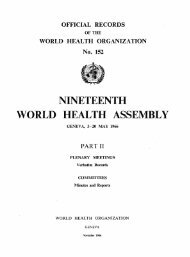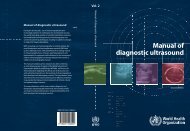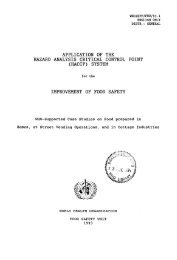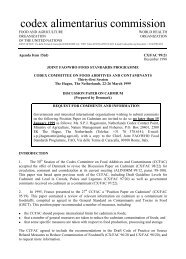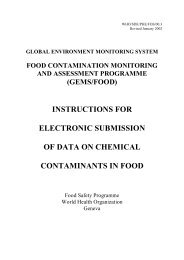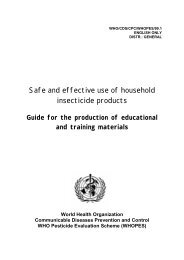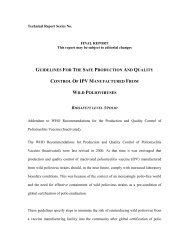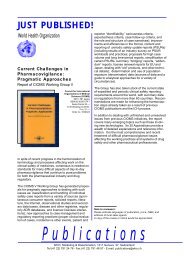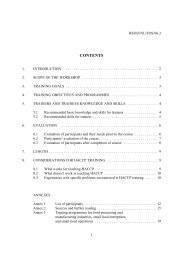WHO Drug Information Vol. 20, No. 4, 2006 - World Health ...
WHO Drug Information Vol. 20, No. 4, 2006 - World Health ...
WHO Drug Information Vol. 20, No. 4, 2006 - World Health ...
Create successful ePaper yourself
Turn your PDF publications into a flip-book with our unique Google optimized e-Paper software.
<strong>WHO</strong> <strong>Drug</strong> <strong>Information</strong> <strong>Vol</strong> <strong>20</strong>, <strong>No</strong>. 4, <strong>20</strong>06 Safety and Efficacy Issues<br />
References<br />
1. Commission on Genetics, Pregnancy and<br />
the Child, International League against<br />
Epilepsy. Guidelines for the care of women of<br />
childbearing age with epilepsy. Epilepsia<br />
1993;34:588–9.<br />
2. Adab N, Tudur SC, Vinten J, Williamson P,<br />
Winterbottom J. Common antiepileptic drugs<br />
in pregnancy in women with epilepsy.<br />
Cochrane Database Syst Rev <strong>20</strong>04;(3):<br />
CD004848.<br />
3. Editorial. Teratogenicity of antiepileptic<br />
drugs. BMJ <strong>20</strong>06;333:615–616<br />
4. Morrow JI, Russell A, Gutherie E, Parsons<br />
L, Robertson I, Waddell R, et al. Malformation<br />
risks of anti-epileptic drugs in pregnancy: a<br />
prospective study from the UK Epilepsy and<br />
Pregnancy Register. J Neurol Neurosurg<br />
Psychiatry <strong>20</strong>06;77: 193–8.<br />
5. Vajda FJ, O’Brien TJ, Hitchcock A, Graham<br />
J, Cook M, Lauder C, et al. Critical relationship<br />
between sodium valproate dose and human<br />
teratogenicity: results of the Australian register<br />
of anti-epileptic drugs in pregnancy. J Clin<br />
Neurosci <strong>20</strong>04;11: 854-8.<br />
6. Wyszynski DF, Nambisan M, Surve T,<br />
Alsdorf RM, Smith CR, Holmes LB. Increased<br />
rate of major malformations in offspring<br />
exposed to valproate during pregnancy.<br />
Neurology <strong>20</strong>05;64: 961–5.<br />
7. Holmes LB, Wyszynski DF, Lieberman E.<br />
The AED (Antiepileptic <strong>Drug</strong>) Pregnancy<br />
Registry: a 6-year experience. Arch Neurol<br />
<strong>20</strong>04;61: 673–8.<br />
Meningococcal vaccine and<br />
Guillain Barré syndrome<br />
United States of America — The Food<br />
and <strong>Drug</strong> Administration (FDA) and<br />
Centers for disease Control ( CDC) have<br />
updated an October <strong>20</strong>05 alert to consumers<br />
and health care providers regarding<br />
reports of Guillain Barré syndrome<br />
(GBS) following administration of Meningococcal<br />
Conjugate Vaccine A, C, Y, and<br />
W135 (Menactra®).<br />
To date, a total of 15 confirmed cases of<br />
GBS among individuals 11–19 years of<br />
age occurring within six weeks of vaccination<br />
with Menactra® have been reported<br />
to the Vaccine Adverse Event<br />
Reporting System (VAERS). Two additional<br />
cases have been confirmed in<br />
persons <strong>20</strong> years of age and older. At<br />
this time, CDC and FDA cannot determine<br />
with certainty whether Menactra®<br />
does increase the risk of GBS in persons<br />
who receive the vaccine and, if so, to<br />
what degree.<br />
In October <strong>20</strong>05, reports indicating a<br />
possible association between Guillain-<br />
Barré Syndrome (GBS) and meningococcal<br />
conjugate vaccine (MCV4)<br />
(Menactra ® ) were made to the Vaccine<br />
Adverse Event Reporting System<br />
(VAERS). GBS is a serious neurologic<br />
disorder involving inflammatory demyelination<br />
of the peripheral nerves. During<br />
March <strong>20</strong>05—February <strong>20</strong>06, eight<br />
confirmed cases had occurred within 6<br />
weeks (i.e., the time window of elevated<br />
risk noted for GBS after administration of<br />
other vaccines) after MCV4 vaccination.<br />
Nine additional GBS cases were reported<br />
to VAERS during March—September<br />
<strong>20</strong>06. Although data suggest a small<br />
increased risk for GBS after MCV4<br />
vaccination, the inherent limitations of<br />
VAERS and the uncertainty regarding<br />
background incidence rates for GBS<br />
require that these findings be viewed with<br />
caution.<br />
References<br />
1. FDA MedWatch alert: Menactra® (Meningococcal<br />
Conjugate Vaccine A, C, Y, and W135):<br />
Posted 10/23/<strong>20</strong>06. http://www.fda.gov<br />
2. FDA News, P05-66, 30 September <strong>20</strong>05.<br />
3. VAERS at http://www.vaers.hhs.gov<br />
4. FDA and CDC Update <strong>Information</strong> on<br />
Menactra® Meningococcal Vaccine and<br />
Guillain Barre Syndrome. <strong>20</strong> October <strong>20</strong>06 at<br />
http://www.fda.gov/bbs/topics/news/<strong>20</strong>05/<br />
new01238.html<br />
247


